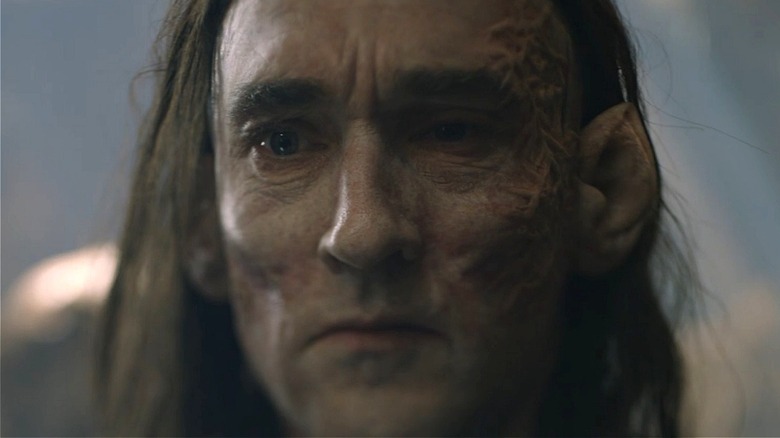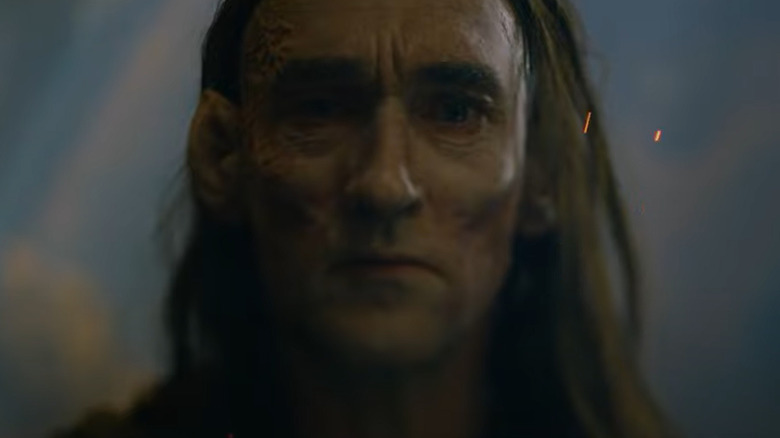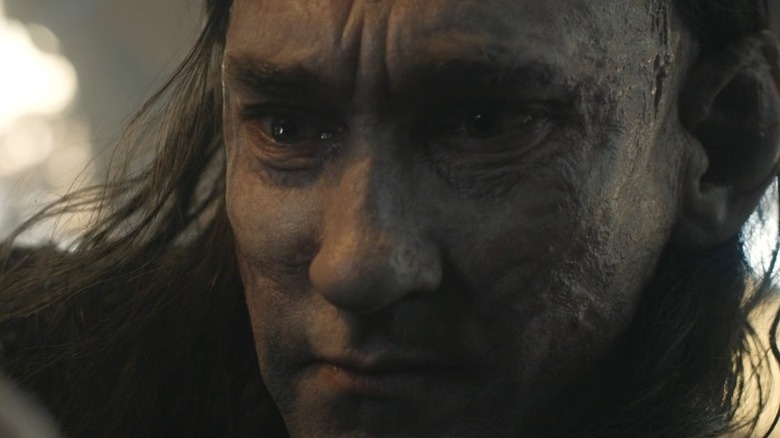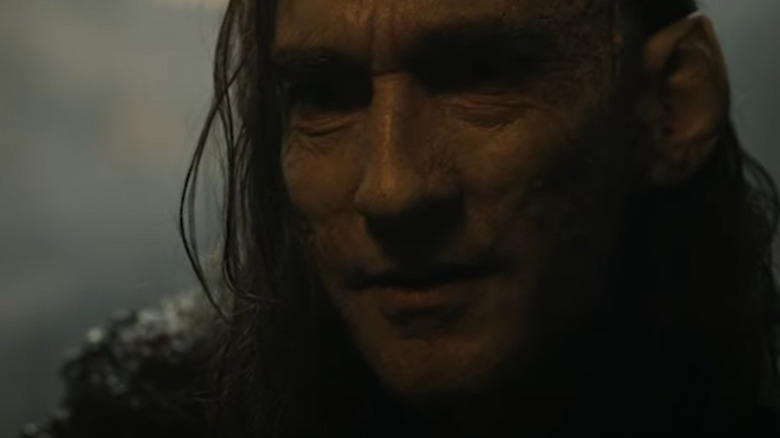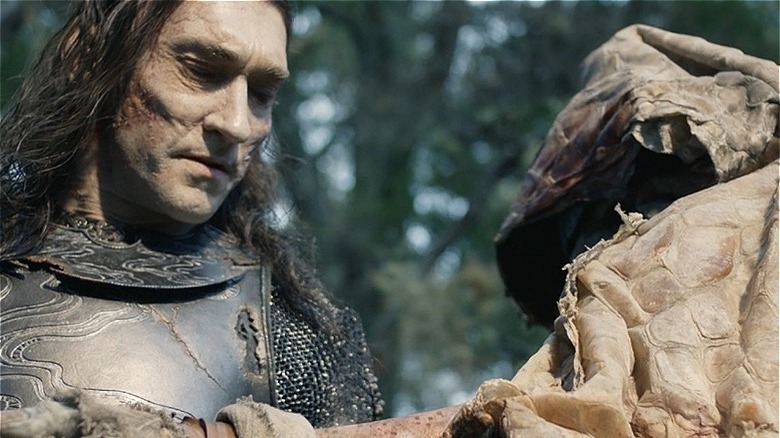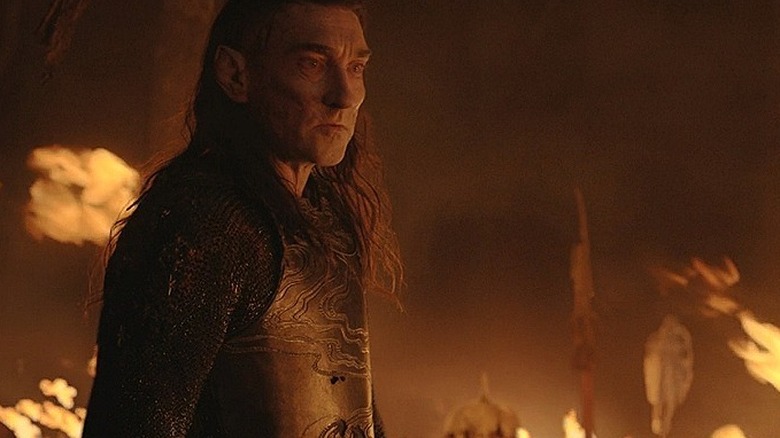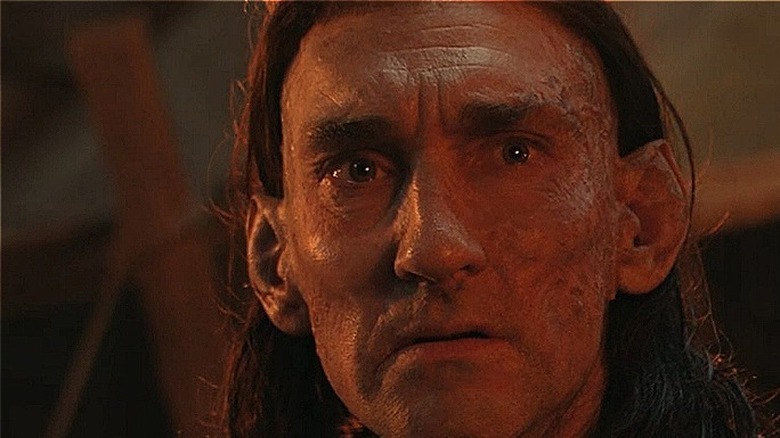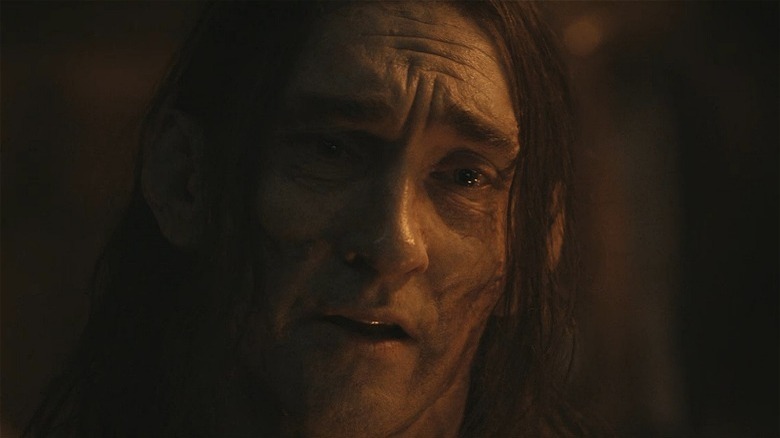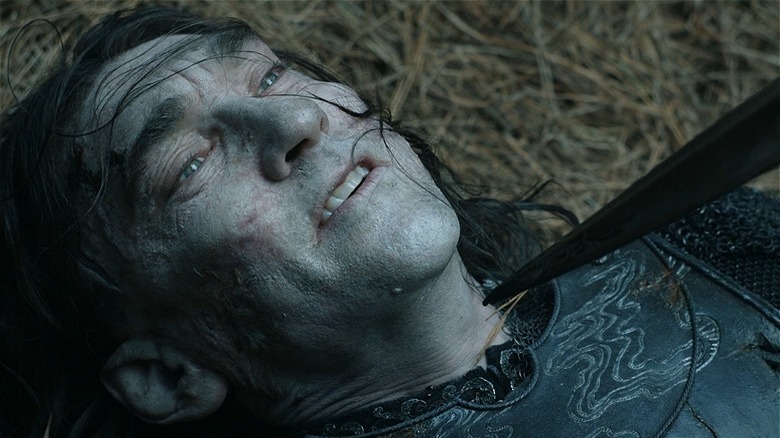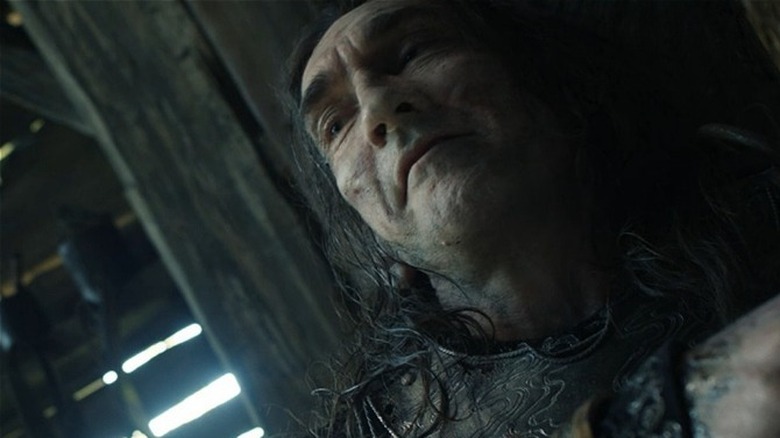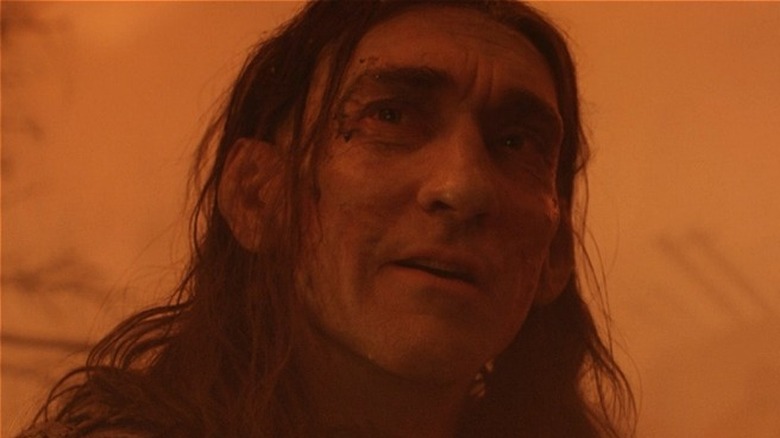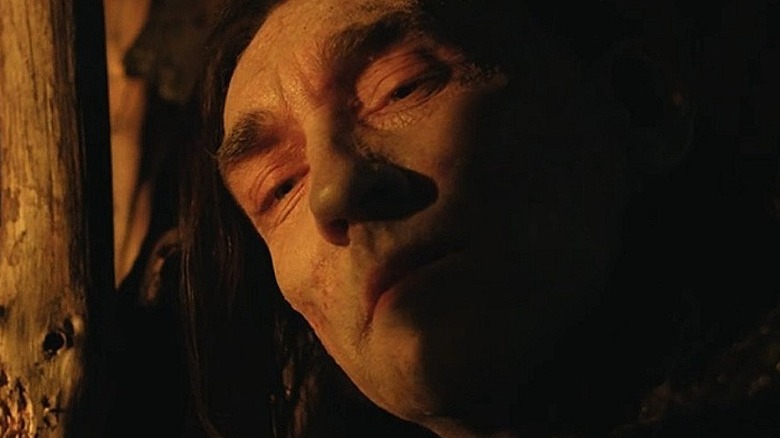Adar's Best Moments In The Lord Of The Rings: The Rings Of Power Season 1
"The Lord of the Rings: The Rings of Power" is Amazon Prime's billion-dollar endeavor in epic television, bringing J.R.R. Tolkien's Middle-earth to life in a prequel set thousands of years before the events of "The Hobbit" and "The Lord of the Rings." The final product exceeds expectations — it's cinematically beautiful and painstakingly detailed with surprisingly nuanced characters.
Familiar characters' endings are already foregone conclusions. We know Galadriel ends up in Valinor, and Sauron becomes a giant eye that gets defeated when Sméagol bites off Frodo's finger and the Ring and falls into the lava of Mount Doom. Telling a compelling story when viewers know the end is a unique challenge but it's hardly unprecedented. In fact, Shakespeare often opened plays with the ending (ex: "Romeo & Juliet") and modern audiences are just as enraptured in the mechanics of the plot. "The Rings of Power" turns such storytelling on its side.
When "The Rings of Power" Season 1 first aired, many fans were familiar with some of the characters, but wondered who Adar is. The formidable villain Adar (Joseph Mawle) is an entirely new invention for the series, and the character upset Tolkien purists in some camps. However, Adar proved to have some of the best moments in the series precisely because of his wildcard potential. As a new character to the Tolkien-verse, what possibilities does Adar open up?
Adar's dramatic entrance
Adar doesn't appear until the end of Episode 3 (helpfully titled "Adar"), but his entrance is unsubtly foreshadowed by the episode's title in addition to the reverence with which the Orcs speak of their "father." Who could possibly be the father of Orcs? Is he Sauron by another name? An Orc? Details about Adar are hard to come by. Even the New York Times wrote: "Who is That Guy?"
By the time Adar enters the picture, he's hyped up with a reputation that looms ominously. Adar seems to be the mastermind of a nefarious tunneling project with an unknown purpose that uses Orcs, enslaved Elves, and horrifying wolf creatures to dig its path through the Southlands.
The buildup to Adar's entrance pays off — he enters at the end of Episode 3 as a blur with one hand in a metal glove. It's unclear whether this dark personage is Orc, Man, or something else. The building tension and terror of peering for a glimpse of this villain, that only leads to a roll credits, is absolutely one of Adar's best moments.
Father of Orcs
The cliffhanger of Episode 3 is quickly paid off in Episode 4, "The Great Wave." Adar diverts his ominous demeanor from Arondir to an Orc Arondir recently injured. The first glimpse of Adar's face in focus reveals a mask of scars and sadness. Adar kneels with the Orc and holds him like a father before using his knife to put him out of his misery. It's a shocking moment of intimacy, empathy, and grit from a man of mystery.
This scene gives Adar a wonderful moment of demonstrating dynamic care and fascinating love for his "children." In many ways, this scene sends chills up the spine. A villain who is set on meaningless destruction and war (what we conventionally think of as Orc-like behavior) is predictable; a villain that has a thoughtful, quiet, and empathic manner with his army means all bets are off. What is Adar's origin, and how did he become leader of the Orcs?
A villain full of surprises
"The Great Wave" continues to deliver surprises and left turns from Adar during his conversation with Arondir. This is one of Adar's best moments because he is entirely unpredictable and unusually peaceful in his choices. The Orcs leave Adar alone with Arondir, and Adar stands in beams of sunlight breaking through the slats over the tunnel. It becomes plainly obvious that he's not an Orc. Adar's ears and his command of Elvish land a heavy surprise — Adar is an elf ... or at least he used to be.
The surprises keep coming as Adar listens intently and demonstrates that his empathy isn't limited to his children; he appears to have genuine empathy for Arondir. He seems to work out a plan in real time during their short conversation and takes another left turn — he's letting Arondir go, as long as he delivers a message.
Adar is a terrifying villain because he's so soft, quiet, and thoughtful; you can almost see the gears of rationality and emotion working in real time. If Adar is listening, he's strategizing ... and he's always listening.
Saying goodbye to the sun
In Episode 5 ("Partings"), Adar has a wonderful moment in the woods of the Southlands as he looks at the trees and basks in the sunlight, feeling the earth. He looks happier than he does in any other moment in the season, but there's also an obvious bittersweetness on display. He feels an air of grief and heaviness in the daylight.
He's accompanied by an Orc who's wearing protection from sunlight but is clearly not happy about it. Adar turns to ask the Orc how painful the sunlight is, and is fascinated and saddened by the response. Adar demonstrates compassion for the Orc's suffering, and Adar turns to let go of light and warmth once and for all.
While he's obviously conscious of the different needs of his Orcs, Adar doesn't seem to totally reject his Elven heritage. Adar accepts his fate, and the reality that building a future for himself and his "children" will require sacrifice. This moment is one of Adar's best because it's a rare, quiet moment of downtime before the storm. The pacing of "The Rings of Power" is largely regulated by Adar's calculated and patient approach.
Don't call me Sauron
One of Adar's best moments from "The Rings of Power" Episode 5 happens while he listens to the Southlanders who abandoned the tower swear loyalty to his cause. He's hard to read, somewhat nonplussed, but he's calculating with every new bit of information he receives.
When Waldreg swears loyalty to Sauron, Adar flips a switch and flies into a fit of rage, pouncing on Waldreg with terrifyingly speed. His serene, dour expression lights up with frenzied anger for a split second, leading to big questions. Why does Adar find Waldreg's allegiance so, for lack of a better word, triggering? So far, Adar hasn't lost his cool. What if he is not, in fact, Sauron?
As shockingly quick as his rage comes out, Adar switches again back into a calm and formidable leader. He announces that blood must be spilled to pledge allegiance and forces Waldreg kill a boy from his own village.
For the first time, Adar proves himself to be violent and unpredictable in ways that would be expected of a regular villain. However, his level demeanor thus far makes this scene an intense experience and one of the best Adar moments.
A rousing pre-battle speech
What's a fantasy villain without an epic pre-battle speech to rally their troops?
Episode 6 ("Udûn") delivers Adar's moment to shine as a leader as he gives a rousing speech to his Orc army before storming the tower. Adar shows strategic genius and willingness to accept the inevitability of casualties in a measured, realistic way. Despite being a villain, he doesn't seem to lie to his army — if anything, the speech prepares them for the hard truth of loss in the pursuit of their goals. Although it's unclear at this point in the series what Adar's end game is, seeing him commit to rally his Orcs to sacrifice themselves means it must be extremely important to him. By this point, Adar's decision-making has created a pattern and establishes that this character knows what he's doing. Joseph Mawle looks incredible as he strides across rugged terrain, framed by torch fire and Orcs as he orchestrates a complex takeover that keeps everyone guessing.
The great strategizer gets out-strategized
"Udûn" continues to deliver excellent Adar moments later in the episode when he leads his Orcs to storm the tower only to find themselves in a trap. Adar's demonstrated incredible foresight and strategizing so far; how does he handle being out-strategized?
Adar knows things are amiss immediately, and his wheels turn as he scans the ramparts of the tower. Adar is a delightful villain to watch because he's frighteningly intelligent and seems to not only have rational faculties well above the curve, but an intuitive emotional sense. He catches on to the destructive fall he and his Orcs are about to endure in eerily quick time.
Although the Southlanders succeed in trapping the Orc army in the stronghold as the tower tumbles down on them, Adar succeeds in a less obvious way — at the last moment, he makes another surprising decision by throwing Waldreg out of the way of certain death.
This incredible Adar moment is topped off by how, naturally, he survives the incident.
Adar out-out-strategizes the out-strategizers
Even after a tower falls on his head, Adar's not done throwing curveball after curveball into the unfolding plot of "Udûn."
The Southlanders go back to their village after their victory at the tower to prepare for the battle to come. They know the Orcs will be coming, and they do — however, the Southlander villagers crush them with clever strategy and a lot of fire.
As soon as the Southlanders congratulate themselves, they find their victory soured. An enemy helmet is removed to reveal the face of a man who was formerly one of their fellow villagers ... and it turns out he's not the only one. Adar's foreshadowing line that blood sacrifice must be paid comes full-circle as Adar and his Orc army descend upon the stunned and unprepared villagers.
Adar is a cunning general, and although the Southlanders caught him unawares at the tower, he anticipates their plan and out strategizes his out-strategizers. It's a respectable move for a villain to make juxtaposed with the brutal reality of war and death he's brought upon this village.
But he's not done. Adar is looking for something, and these villagers are hiding it. His intuition and empathy make him a truly powerful villain, and he knows how to hold the Southlanders' feet to the fire. Although Adar orders villagers' deaths until he gets what he wants, he conveys what's almost sadness about the violence, as if it wasn't his idea and he couldn't put a stop to it if he wanted. Adar's empathy and the way he uses that as uncanny sense of what others care for makes him an expert at divining how to threaten them. Soon enough, Adar gets what he's looking for.
Taken down by Halbrand
Adar's moment of victory in "Udûn" is quickly dashed by the approaching hooves of the Númenor army, Galadriel, and Halbrand. Bedlam ensues; brutal war and carnage surround clashes of characters like none before in this series. In the chaos, Adar escapes by horse.
This leads to an awesome horse chase scene with Galadriel in pursuit, scratching many LOTR fan itches for a horseback forest pursuit. Adar flees, egoless about abandoning his Orc army to save himself. As Galadriel gains on Adar, Halbrand approaches from the opposite side and trips Adar's horse.
Adar and his horse tumble to the ground. Luckily, Adar's horse gets up — apparently suffering more from wounded pride than any physical injury. However, Adar himself is not so lucky and stays down. He's been a formidable leader, general, and villain — who does he become in defeat?
Adar's continually surprising character development takes a huge leap in this scene as he stares down the possibility of his own death in the eyes of Halbrand. Halbrand clearly has a vendetta against Adar and is poised to kill him, and their exchange is chilling. Adar is completely at peace with his death in a way that doesn't sit well ... yet seems dignified. In fact, Adar seems just as dignified in defeat as he does in victory.
Galadriel and Adar's conversation
"Udûn" is something of an Adar episode. Virtually every seen adds to his highlight reel of best moments.
After the battle, Galadriel takes Adar back to the village to question as him as a hostage. Their exchange is electric with a palpable tension. Galadriel's been looking for Morgoth's successor for centuries. Has she found him?
The dialogue is laden with new information. Galadriel reveals Adar's possible origin as one of the Moriondor – Elves who were stolen and twisted into some of the original Orcs. Adar doesn't confirm or this, but delivers a massive twist in this scene when he calmly tells Galadriel about his mutiny to Sauron. Joseph Mawle really shines as he spins a long soliloquy about following Sauron to the North in his endless quest for power and revenge, and triggers parallels to Galadriel's experience of mutiny in the North.
Overall, a big question so far surrounds the nature of Adar's plan. Although it's still not apparent, it's clear his plan makes sense to him, and has to do with taking care of the Orcs, which is beautifully consistent with his odd balance of evil and kindness. The scene opens up questions of good and evil; Adar seems more balanced than Galadriel, who comes off rather genocidal in her vows to wipe the Orcs out of existence.
The kicker of this incredible scene is when Adar asks Halbrand "Who are you?" in such a way that hints of Halbrand's true identity without giving it away. Adar talks as if he's all-knowing, but it seems his perceived omniscience has its limits.
The destruction of Middle-earth's Southlands
Adar achieves his goal, and the sinister intricacies of it become apparent at the end of "Udûn."
The tunnels, the sword, and Mount Doom all make sense in a Rube Goldberg machine of natural disaster enabled by Adar and his Orc army. The sword opens dams, and those dams flood the tunnels into Mount Doom's lava, which causes it to erupt. The Southlands are destroyed by burning ruin as ashes coat the sky, blocking out sunlight.
The visuals of this sequence are phenomenal. The payoff of Adar's mystery, his clever and gentle approach, and his resigned attitude when captured all come to a mind-blowing climax. His joy as he senses the rumbling of water flooding the tunnels beneath the floorboards of his defeat is chilling.
In a way, Adar is creating accommodations for his children, which is a relatable villain motive. The Orcs are harmed by sunlight and need a land of their own. The problem is when they were created, all of Middle-earth was already spoken for. The Orcs didn't ask to exist, but they still have needs. Adar's character is a surprising gateway into Orc empathy ... albeit in a villainous way.
Adar's surprising victory should be expected by now, but even the most surprising villain has tricks up his sleeve. For one last trick, he survives and establishes a strong possibility that we'll see him again in Season 2.
Adar pulls off Mordor in an unlikely way
Let's go back for a moment to Adar's quick regroup when the Númenóreans catch him and his army unawares. Right before he's lost in the bedlam, he says, "Waldreg, I have a task for you." Nothing more is mentioned, and until Waldreg is revealed placing the sword into the tower's receptacle and triggering the chain of events that result in the creation of Mordor, it's a forgotten line.
However, when reflecting on the bombastic and elaborate plan to turn the Southlands into Mordor, it's clear that Adar is an extraordinarily deft strategist, and his ability to plan on the spot is what seals his victory in the end. Had he not saved Waldreg at the tower, and had he not made the split-second decision to entrust Waldreg with the final step of the plan, none of the events in "Lord of the Rings" would come to pass.
The way Adar manages to pull off Mordor is delightfully held off till the last second and makes his casual attitude as a prisoner pay off in a huge way that opens up more possibilities. What role will Adar play in the rise of Sauron? Fans will have to wait for "The Rings of Power" Season 2.
